- Home
- Christina Lauren
Twice in a Blue Moon Page 10
Twice in a Blue Moon Read online
Page 10
“So, if I start the tweet with someone’s Twitter name,” I say, looking up from my phone, “everyone who follows me can see it?”
Marco is leaning back in through the passenger window, telling the driver where to meet us, and when. He straightens, glances at my phone, and waves me away. “Don’t worry about any of that. I have all the answers typed out for you. Just use the hashtag, and you’ll be fine.”
I take the folder he hands me, scan the questions and answers inside, and gaze up at him with melting gratitude. “How would I function without you?”
“You’d be curled in the corner of your messy house, eating Lucky Charms out of the box by the handful.” He checks the time. “Five questions, and then we’re out. Don’t get chatty. We need to get on the road by noon.”
I salute him obediently and follow him up the steps.
“Here we go,” he says under his breath. And then, he turns to me, asking more seriously: “Are you ready for this?”
He’s implied this question every time I’ve had to sign my name on a contract, every time a piece of this collaboration moves forward. But there’s a duality there now: he’s asking whether I’m really ready for what we’re about to dive into promoting headlong—my seventh feature film, but the first I’m making with my father. Awareness pulls me up short in a bright square of concrete.
“I hope I am.” I gape at him, heart pounding as if maybe I’ve made a huge mistake. It happens a little bit each time I start something new: the sense that I’m really a fraud, that I don’t actually know what I’m doing, that I somehow got into acting on a technicality and not because I earned it.
Usually the feeling evaporates pretty quickly. This time, though, it’s hung around since I officially agreed to take on the role of Ellen Meyer: farmer, local civil rights activist, and badass extraordinaire. Some of that has to be due to the pressure of leading a film with my extremely famous father in only a supporting role. And some of it has to come from knowing that we’ll be on a rural location together for a month and a half, and I have no idea whether it will bring us closer at all.
And on top of that—the pressure of acting with Dad aside—I’ve never done anything like this. Milkweed is a subtle script: the story about a tenacious woman who comes back from heartbreak to find the love of her life and help shape her small Iowa community, while going through the pain of losing a parent to dementia. It’s brilliant but entirely character driven, and will require acting chops I’m not even sure I have, under the guidance of one of the best directors in the world.
“What if I’m not ready?” I ask, chewing my lip.
“The correct answer was yes,” Marco says, tapping my chin so I’ll stop biting down on my abused bottom lip. “You are.”
His confidence in my ability has always been solid, but I know this right here is part bravado, too: the pressure for Dad and me to do a film together has been slowly building to a hysterical frenzy. It’s no longer a When Will They? headline, it’s become a Why Haven’t They? Admittedly, as Dad’s career has slowed down and mine has picked up, it feels like the perfect time for our Jane-and-Henry-Fonda moment. The script is incredible, the timing works, and I wouldn’t even be relying on Dad’s celebrity to get me in the door: if I back out now, it would be a PR nightmare for Marco.
“You are, Tater Tot.” A sweet smile and a wink take the edge out of Marco’s next words: “Don’t make my life a living hell.”
He pulls open the glass door, gesturing for me to go ahead of him. Cameras flash, applause rises in welcome, and although my brain is still stalled out, my body makes the subtle shift from Me to Tate Butler: My eyes widen, and an easy smile spreads across my face. I stand a little straighter, walk a little looser.
A tight semicircle of people waits just inside the gleaming lobby, and a stocky, bald man with a salt-and-pepper beard steps forward, hand extended. “Hi, Tate; hi, Marco. I’m Lou.” Lou Jackman, according to the notes I crammed in the car. Twitter’s VP and head of community engagement. “It’s fantastic to meet you.”
I grip his hand. “Thank you for having us today.”
He laughs. “Are you kidding? Anytime. We’re grateful you made room in your schedule.”
“Let’s hold off on the gratitude until you see me tweet,” I tease. Flashes pop in a constellation behind him.
“I think you underestimate how many people are looking forward to this.” Lifting his chin, Lou pulls my attention across the room to where a table has been set up with two laptops side by side, two elaborate black desk chairs, and a small vase of flowers. A bowl of Skittles tells me someone did their homework on the famous Ian Butler sweet tooth. An array of cameras on tripods are set up in front of the table, waiting to catch every one of my fumbling typos. Awesome.
Dad is already here, his charm having been quarantined in a green room until I arrived and they pulled him out from a hallway to greet me. He waves with the trademark crinkly-eyed Ian Butler smile as we approach each other.
My stomach tilts; I saw him only four days ago at the agency offices in LA, but when he stands to give me a hug, a thousand flashes burst as though we’re being reunited after a decade apart all over again—capturing my smile over his shoulder.
The narrative is that we’re as close as any father and daughter could be. The narrative is that we’re together at holidays, birthdays, vacations. The truth is he drops in for a quick glass of wine on Christmas; his assistant Althea recruits Mom’s help to choose something lavish and semi-personalized for me on my birthday, and we’ve never taken even a day of vacation together. Clearly, the narrative is bullshit.
Dad turns to face the room of press and Twitter employees, throws up his arms like this is the greatest welcome he’s ever received, and hurls a smile at them so supremely trademark Ian Butler that a few people actually cry out “Oh my God.” Even with the more stoic men in the room, I sense the collective, vibrating thrill of being so close to a celebrity of his magnitude.
And I get it—he’s an icon. I still have that momentary buzz of adrenaline when I see him. It doesn’t seem to matter that he’s no longer the Ian Butler of fifteen years ago—he’s fifty-six now, at the top of the extended hot years (for men) in Hollywood—he is still charisma personified.
From across the room, Marco is watching me carefully and I know our thoughts are aligned: This is it. I’m about to launch into Ian Butler’s orbit for a solid fifty days in a row. I know we’re both gauging how well I’m going to handle it. I can be surrounded by functional relationships—with my mom, my best friends, even Nana—but five minutes with my father and I’m an insecure, awkward mess.
Looking at Dad’s face still feels like a trick of the imagination. Other than the shape of my ears, which I got from Mom, I take after him completely: the brown hair, the honey-brown Butler eyes, the full mouth. We even share a beauty mark, though his is just at the top of his right cheekbone, and mine is lower. His is a face that should feel so familiar—I see it in the mirror every morning—but it’s still so disorienting to get a good, long look at him. Even fourteen years after our chaotic reunion, I’m pretty sure I’ve still seen his face more frequently on magazine covers than in person.
We sit at the table with an enormous screen mounted on the wall at our backs. With a laptop stationed in front of each of us, we look up expectantly at Lou. Behind him, Marco regards Dad and me with a faint smile. Publicist Marco wants to remind me to keep my smile natural for the cameras. Friend Marco wants to give me a hug and tell me, You don’t have to be so nervous. You don’t have to prove anything to him.
Dad’s elbow knocks into mine and he reaches over, cupping it gently, paternally, saying a quiet, “Sorry, baby.”
Another staccato of flashes captures the moment.
“The questions you’ll need to answer are from the main Twitter account,” Lou explains. “So they’ll be from ‘at Twitter.’ These are the questions we sent over last week.”
Behind him, Marco motions for me to pull my answers f
rom the folder.
“You’ll probably also get some questions from other users,” Lou says, “in the hashtag—which is just ‘hashtag AskButlers’—and although it’s by no means required, you’re welcome to answer any of those that you like. We just ask that you try to remember to include the hashtag in your replies.” He gives me a teasing wink. “Sound good?”
We nod, relatively unconcerned because this is a fairly simple ask. It’s not like the tearful reunification interview Dad and I did with Barbara Walters only a week after I returned from London. It’s not like the Vanity Fair shoot we did six years ago where we were required to be in near constant physical contact for over seven hours. And it certainly doesn’t compare to the exhaustion of the one and only time I walked the red carpet with Mom on one side and Dad on the other. The only reason Mom agreed to come was because it was my first Emmy nomination and the speculation about whether my parents were bitter enemies was reaching an exhausting fever pitch. Even tourists in Guerneville were stopping her in the café to ask her about it. As Mom said to me that night while we got ready, “To be bitter enemies, I’d have to give a shit.”
Marco and Mom: my two calm, stoic constants.
Nana, on the other hand, doesn’t ask about any of it. When I come home to Guerneville, I may as well be visiting from a space station or coal mine.
I settle in front of the computer, waiting for the first tweet to appear. Beside me, Dad shifts. “How was your flight from LA, kiddo?”
Flash. Flash. Over here, Tate! Flash.
“It was fine,” I say. Ever the performer, Dad nods and casually goes back to scrolling through Twitter, but the silence that follows is heavy and loaded. Marco reaches up, pulling on his ear—his sign that I need to relax. I look at Dad and give him a goofy smile. “It was only an hour but I fell asleep and am pretty sure I drooled the entire flight.”
Dad roars with laughter at this, and the press gobbles it up. My heart is a tiny, anxious bird in my chest.
You don’t have to prove anything to him.
“Here we go,” Lou says, and a tweet appears in the column.
@Twitter: This is your first project as co-stars. What aspect of the process are you most looking forward to? #AskButlers
Ducking, Dad immediately begins typing. He’s so good at this; he’s been doing all kinds of press tours for so long that he doesn’t even question anymore whether he’ll come off as natural. Everything he says is adored. Without referring to notes, he hunts and pecks enthusiastically at the keyboard. Surreptitiously, hoping that the press doesn’t realize I’m not writing this from the gut, I peek at the answer Marco has crafted, typing the words and double-checking for typos before hitting send. My tweet pops up only a second before Dad’s does.
@TateButler: Milkweed is the project we were always meant to do together. It may sound silly, but I just can’t wait to be on set with my dad.
@IanButler: Working with my daughter is the biggest item remaining on my bucket list. It’s all going to be a joy! Tate is the best actress of her generation, and a true gift to me as a father. #AskButlers
My heart is a beast with claws that extend, wrapping around the compliment. I gobble it down.
“Tate,” Lou says gently, “if you could use the hashtag… ”
Oh, shit. “Sorry, sorry.”
Beside me, Dad beams in my direction. “I thought I was supposed to be the technologically impaired one.”
I toss my head back and laugh. Ha, ha, ha. Inside, I am mortified.
When it’s just me—Tate Butler, actress—I’m not intimidated by flashing cameras, by probing interviews, by the heated press of fans. I’m not the wide-eyed, wobbly-chinned girl anymore, sitting on the couch between Dad and Mom, giving my well-rehearsed answers in front of a camera crew. But when I’m near Dad, the entirety of who he is seems to dwarf me. I feel a little like a computer with a glitch.
The second question comes in, and I find myself holding my breath, even though I know it won’t be personal. It’s asking for a short summary of the movie. And the one after that asks what films or shows we’ve seen lately and loved. Two more softball questions, and we’ll be done.
I type Marco’s answers, add the hashtag, and try to keep my heart rate as even and slow as possible. It isn’t the official Twitter questions that bother me—those are all standard—it’s the others I notice, the ones I know see right through me.
Why would you do a movie with that piece of shit womanizer? #AskButlers
I want to have Ian’s babies and don’t even care that he could be my grandpa. #AskButlers
Wait, I thought they hated each other? #AskButlers
If Tate hates him so much, she can get the fuck out of the way. #AskButlers
This is such an act. They look like strangers. #AskButlers
IAN BUTLER I WANT TO HAVE YOUR BABIES! #AskButlers
The feed scrolls continuously on the enormous screen above our heads, and I can see the press reacting to every single tweet—pointing at some, laughing and nodding at others. Dad remains oblivious, seeing only what he wants to see and happily typing out his perfect, off-the-cuff answers. He’s used to living inside the heat of the sun, the pressure of the public opinion. Fourteen years later, I’m still figuring out how to navigate the good and let go of the bad.
When the chat finishes, Marco is up front, apologizing immediately and explaining that we need to get rolling. But Dad stalls us, managing to give me a tiny look that communicates, This is your job, give them what they want. What they want is us embracing, his lips pressed to my cheek, and—just before Marco hauls me out of there—Dad picking me up around the waist in a hug, swinging me around as I laugh in delight.
Finally, we push through the doors and into the suffocating September heat. It’s so warm the concrete weaves in front of us.
“Okay, let’s hustle,” Marco mutters, and waves as our car pulls around the front of the building. We’re leaving straight from here to go to the farm in Northern California where we’ll start shooting tomorrow. I can tell Marco doesn’t want the press to catch on that we’re not sharing a car up there with Dad.
But Dad stops us just as I reach for the car door. “Cupcake,” he calls out, and his smile is captured by a photographer only a few feet away. But then his voice goes soft enough that only I can hear it. “Everything okay, kiddo?”
“Yeah,” I say, and motion for Marco to climb in ahead of me. “Just excited and anxious, I think.”
“Okay, good. I wanted to check in.” He smiles warmly at me, but there’s an edge there I can’t miss. “You weren’t your usual perky self in there.”
My stomach tilts. “I wasn’t?”
“A little off, I guess?” He presses a hand to my face, eyes wide and so full of concern that even I could believe it’s real. “Be sure to rest up next time we have to do some press together. We always want to finish strong.”
The rebuke lands like a small shove, and I nod quickly. “Absolutely.”
“Just remember,” he says, and his hand slides up from my cheek so he can tug on my earlobe, “people want to see us having fun together.”
With a little wink, he strides off to the other car at the curb, where Althea waits by the open door.
A few photographers linger nearby, snapping pictures of Dad’s departure. I struggle to look nonchalant and tack on a breezy smile as I climb into the car.
As soon as I sit down, Marco says without even blinking, “You were not off.”
“I don’t know, maybe I was.”
“No.” He turns to face me as the car surges forward and we pull away from the curb. “If you were off, I would tell you to get your shit together. I’m not telling you that, because I don’t need to.” He lifts a hand, holding up one finger. “Pay attention, Tate, because what I’m about to tell you is something you’re going to have to repeat to yourself a thousand times in the next month and a half. Are you listening?”
I smile at his ready-to-battle tone. “Yes.”
“Your dad is insecure,” Marco says. “He’s not the name he used to be.”
This pings a strangely tender, protective bone in my chest. “I know.”
“You are on your way to becoming a huge star,” he continues, “up-and-coming. You are the lead of this film. He is in a supporting role.”
“I know.”
“But he’s still Ian Butler, and he’s going to make sure you know your place.”
I swallow, hating that he’s right. It’s another point of contrast between my two parents: Mom lifts me up. Dad lifts me up so that he has a higher perch to stand on.
“Some people rise to the top on their own merit, and some people get there by stepping on heads.” Marco reads my mind. He takes both of my hands in his. “Do not let him step on you.”
I take a deep breath and let it out slowly. “Okay. I won’t.”
* * *
It’s a three-hour drive to set, and both Marco and I pass out for the first hour of the drive. But when I wake up, he’s thumbing through a stack of photos.
“What’s that?”
“These are the Vogue covers. We have approval in the contract.”
I peek over at them. In the first, my hair is a wild halo of shimmering auburn. Crystal earrings dangle from my ears to my shoulders, and my makeup is an aggressive streak of black across my lids. The coolest part of the photo (and thank God because it took nearly four hours): my shoulders, arms, and face are dotted with thousands of tiny crystals.
“Wow,” I mumble, pointing. “I like this one.”
“Me too. You’re like a glammed-up Imperator Furiosa.”
I high-five him, and he slips it to the back of the pile. In the second photo, my hair and makeup are done in the style of my breakout role—the crafty and complicated vampire Violet Bisset from Evil Darlings, the sexy, campy, and totally addictive CW show that ran first in its time slot for six consecutive seasons. I suppose it’s meant to show the grown-up side of Violet/Tate: I’m kneeling on the sofa with my back to the camera, looking over my shoulder at the photographer. And, I’m naked. My breasts are pressed against the back cushion, but my ass is almost completely exposed. It’s a great ass—I work hard for it—but…

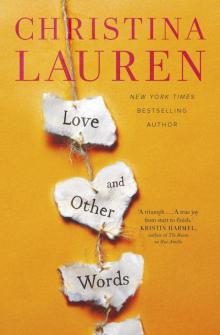 Love and Other Words
Love and Other Words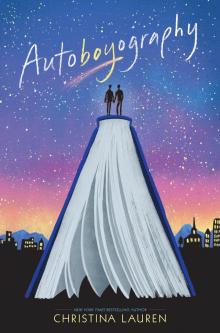 Autoboyography
Autoboyography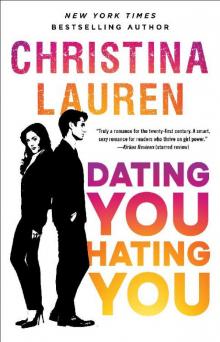 Dating You / Hating You
Dating You / Hating You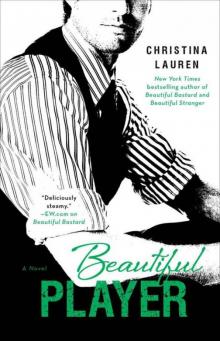 Beautiful Player
Beautiful Player Beautiful Bombshell
Beautiful Bombshell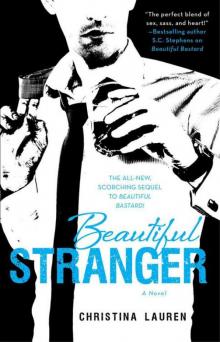 Beautiful Stranger
Beautiful Stranger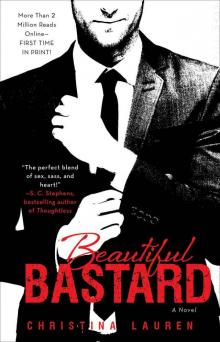 Beautiful Bastard
Beautiful Bastard Beautiful Secret
Beautiful Secret The Unhoneymooners
The Unhoneymooners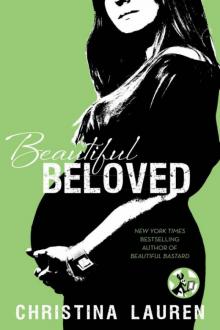 Beautiful Beloved
Beautiful Beloved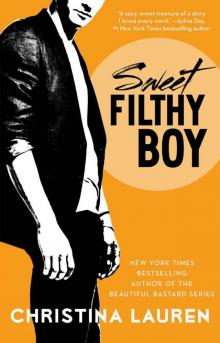 Sweet Filthy Boy
Sweet Filthy Boy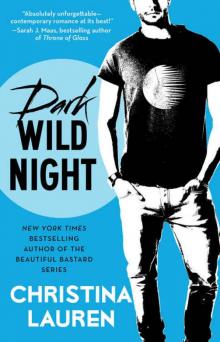 Dark Wild Night
Dark Wild Night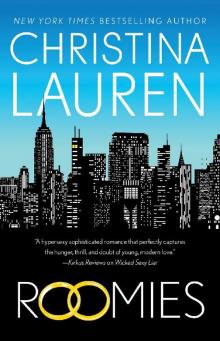 Roomies
Roomies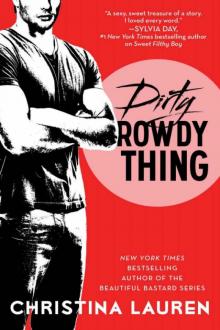 Dirty Rowdy Thing
Dirty Rowdy Thing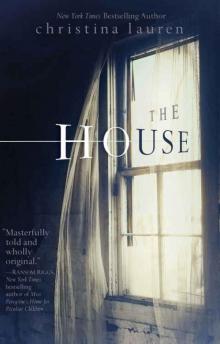 The House
The House Beautiful Bitch
Beautiful Bitch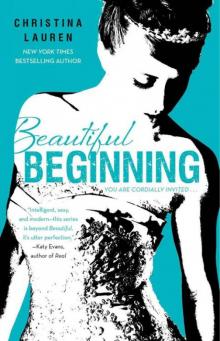 Beautiful Beginning
Beautiful Beginning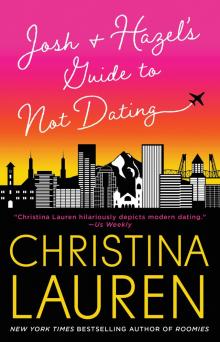 Josh and Hazel's Guide to Not Dating
Josh and Hazel's Guide to Not Dating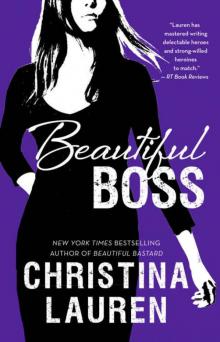 Beautiful Boss
Beautiful Boss In a Holidaze
In a Holidaze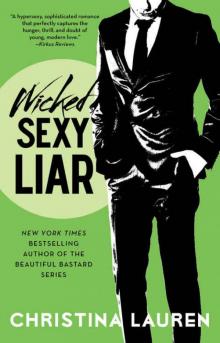 Wicked Sexy Liar
Wicked Sexy Liar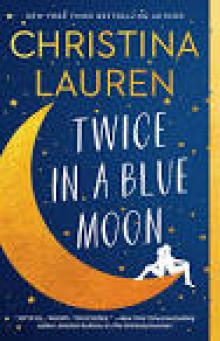 Twice in a Blue Moon
Twice in a Blue Moon Sublime
Sublime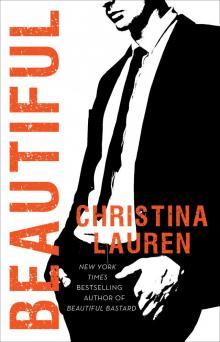 Beautiful
Beautiful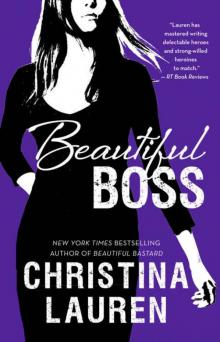 Beautiful Boss (Beautiful #9)
Beautiful Boss (Beautiful #9)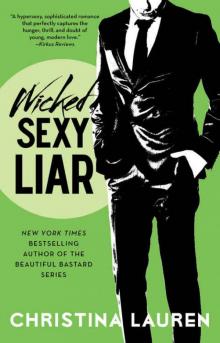 Wicked Sexy Liar (Wild Seasons #4)
Wicked Sexy Liar (Wild Seasons #4)